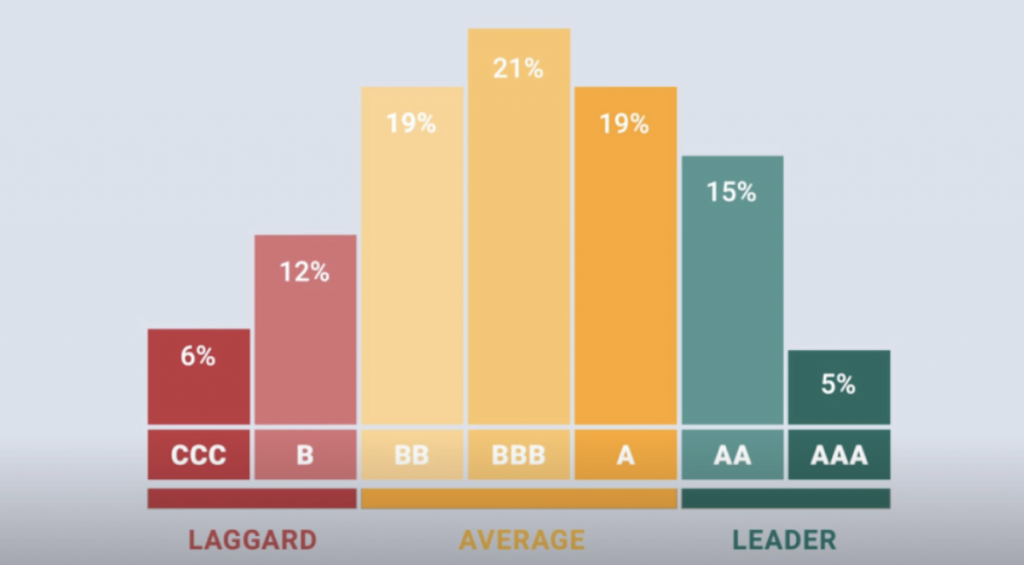By ESG Analyst Tilley Woodford

Why are ESG ratings important?
The development of ESG ratings has been significant in the growth of ESG investing. Overall, these ratings have encouraged companies to consider how their actions impact the environment and have motivated large corporations to reevaluate their operations to be more sustainable. Furthermore, ESG ratings prove valuable as they offer investors essential information that shapes their investment choices and are increasingly relied on and trusted by policymakers. In recent years, ESG has come to the forefront of the media and highly affected corporations’ strategic agendas. Thus, the demand for ESG information has risen, making ESG ratings powerful and influential.
Why do we need greater transparency?
Nonetheless, with the development of the ESG industry and rising engagement in ESG investing, the need for transparency and accountability amongst corporations is a priority. Firstly, there are different ESG rating providers that use various methods and categories to produce their ESG scores; this often results in contradictory ratings and confusion among investors. In addition, rating providers use different data sources and can choose which categories they deem to be most important. As a result, the correlation between many ESG scores and the company’s actual environmental impact is insignificant. For instance, the company MSCI prioritizes other factors such as data protection, corporate board structure, and employment practices over the company’s carbon emissions reduction. Most investors and consumers assume that ESG investing has positive benefits; however, drawing attention to the drawbacks of the ESG rating process and increasing the transparency of rating companies is necessary to give investors the full story.
“[R]atings don’t measure a company’s impact on the Earth and society. In fact, they gauge the opposite: the potential impact of the world on the company and its shareholders.” (Simpson, Rathi & Kishan, 2021)
How do we move forward?
Though ESG ratings have faced scrutiny for their perceived lack of precision, inconsistency, and potential role in promoting greenwashing, experts are encouraging the refinement and correction of these drawbacks instead of abandoning the entire ESG rating system. Experts believe that ESG scores are currently the most effective way of measuring corporations’ ethical and environmental impacts. Scholars recommend creating a consistent framework that collects, analyzes, and aggregates ESG data to ensure consistency. Next, researchers recommend untangling the factors used to calculate ESG scores to determine the effectiveness of the components that comprise the score. For instance, researchers compared eight ESG rating agencies to each other and uncovered that 60% of the total score is what they refer to as ‘noise’ and 40% of the score is a ‘clear signal’. Additionally, MIT researchers argue that simplifying the way ESG ratings are measured to focus on CO2 production is not enough and the ratings will be more effective if more time is taken to analyze the social and governance elements. To reiterate, MIT researchers also do not advocate for standardization and aggregation of ESG ratings because all the scores were created differently and each company has fundamentally different preferences.
Overall, while ESG ratings have their shortcomings as discussed earlier, they still retain their value and can be enhanced to yield advantages. It is crucial for investors and stakeholders to ensure rating agencies are held accountable by advocating for greater transparency, the establishment of consistent data collection frameworks, and the clarification of valuable information from current ESG scores.
Additional Links:
https://www.hoover.org/sites/default/files/research/docs/cgri-closer-look-97-esg-ratings_0.pdf
https://mitsloan.mit.edu/ideas-made-to-matter/esg-ratings-dont-throw-baby-out-bath-water
https://www.bloomberg.com/graphics/2021-what-is-esg-investing-msci-ratings-focus-on-corporate-bottom-line/ https://www.msci.com/
